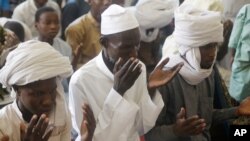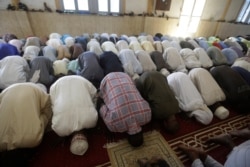More than 700 people have been arrested in Chad following this week's demonstrations against the new military government led by the son of slain President Idriss Deby Itno, the United Nations said Friday.
Civil society groups are renewing calls for more protests over the weekend in the Central African country, where tensions have mounted in the aftermath of Deby's killing that was blamed on a rebel group now threatening to overthrow the interim government.
U.N. human rights office spokesperson Marta Hurtado said it was not known how many of the people arrested after Tuesday's demonstrations are still being detained.
"As further protests and general strikes have been called to take place in the coming days, we stress that Chad remains bound by its obligations under international human rights law to protect and respect human rights, including the right to life, and to facilitate the exercise of the right to freedom of peaceful assembly," she said in Geneva.
Witnesses say that security forces fired live ammunition at Tuesday's demonstrations, which took place in Chad's two largest cities, N'Djamena and Moundou. A military spokesperson has disputed that the anti-government protests were peaceful, saying one crowd killed a retired police officer amid the unrest.
Streets remained calm but heavily patrolled by military on Friday, as many of N'Djamena's residents flocked to mosques for prayers during the third week of Ramadan.
In the country's north, there were conflicting reports over whether the military or rebel forces controlled the town of Nokou. Rebels from the armed group known as the Front for Change and Concord in Chad said they held the town, but the military issued a communique saying that armed rebels had been repelled on Thursday.
The rebels — who are known by their French acronym, FACT — also claimed to have shot down a Chadian military helicopter on Thursday but the government later said the aircraft had crashed due to a mechanical issue.
Chad, a key player in the international fight against Islamic extremism in Africa, was rocked by the April 20 death of Deby, who had been in power for more than three decades. The military formed a transitional government with his son Mahamat at the helm before announcing the longtime leader's death on national television.
The military has blamed his death on the Chadian rebels from FACT, who were based in neighboring Libya and crossed back into Chad on election day earlier this month as Deby sought a sixth term in office. The rebels have repeatedly threatened to march on the capital and depose the interim leader, though are still believed to be some 300 kilometers from N'Djamena.
The political opposition also has called for interim military government to step down, saying that power should have been ceded to the National Assembly president in the aftermath of Deby's killing.
A coalition of civil society groups has called for people to take to the streets on Saturday to demand "a return to constitutional order."





